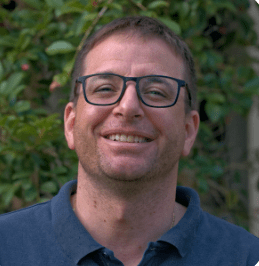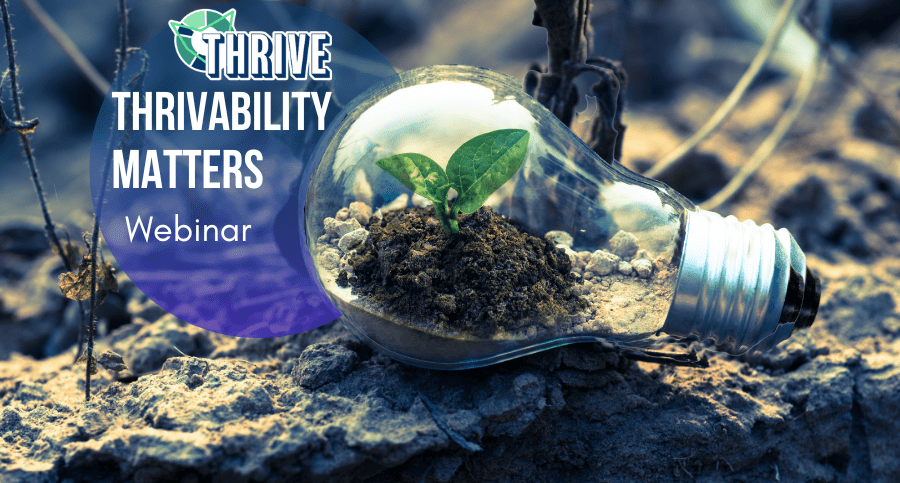The THRIVE project expresses its heartfelt appreciation to Tom Dawkins, Mylène Turban, and Dr Fabio Cortesi for their insightful presentations at the August Thrivability Matters Webinar. The focus of this webinar centred around the United Nations Sustainable Development Goals (SDG6: Clean Water and Sanitation, SDG9: Industry, Innovation, and Infrastructure, SDG14: Life Below Water, and SDG15: Life on Land). Here are our webinar highlights!
About Our Speakers

Tom Dawkins is one of Australia’s leading social enterprise advocates and teachers, a regular speaker at leading events globally and a LinkedIn Top Voice for Social Change. Tom is the Co-Founder and CEO of StartSomeGood, a social enterprise that helps people design, launch, and grow social impact projects, and the Co-Founder of LendForGood, a new crowdlending platform for impact enterprises. StartSomeGood provides fundraising and community infrastructure for social entrepreneurs and designs and delivers impact accelerators and capacity-building programs for partners including Optus, ING, the United Nations Development Program, and the City of Sydney.

Based in Sydney, Mylène Turban works as a Senior Consultant in the Climate Solutions Department of Pangolin Associates. She is a Certified Life Cycle Assessment Practitioner, who completed a Master of Engineering (Industrial Processes) at the University of Technology of Compiègne (France). Mylène went on exchange at the National Technical University of Athens (Greece), and the University of Illinois at Urbana Champaign (USA). Ms Turban worked across the solar and water treatment industry for two years, before switching to climate consulting. With a special interest in public education and regeneration, Ms Turban volunteers with Climate Fresk, running climate change workshops, and Regen Sydney, implementing circular economy framework. Her current key interest is in regeneration, starting on a local scale.

Originating in the Swiss Alps, Dr Fabio Cortesi holds a Bachelor of Science in Plant and Animal Biology, a Bachelor of Science in Marine Biology, and a PhD in Zoology. He has extensively studied the molecular and behavioural function of colourful signals in coral reef fish, their ecosystems, and the deep sea. Upon winning prestigious postdoctoral fellowships from the Swiss National Science Foundation and the University of Queensland, he transferred to the Queensland Brain Institute. His research is, amongst others, funded by the Sea World Research and Rescue Foundation. Dr Cortesi’s 80+ articles have been exposed to substantial media coverage, including exposure in The Washington Post, BBC Earth, BBC Wildlife, Australian Network Ten, and a myriad of others.
Summary Of The Webinar
As an organisation, THRIVE Project endeavours to guide humanity towards a more sustainable future. We had the privilege of hosting these three speakers as guest presenters for our monthly webinar.
Tom Dawkins on “The Social Enterprise Formula”
Tom elaborated on a comprehensive classification system for Social Enterprises. These enterprises create both positive Private Benefits and positive Communal Benefits. The framework discussed entails businesses having a well-defined social or environmental impact strategy and actively engaging in trade, with the majority of revenue generated from these endeavours.
Positive sustainability impacts from businesses manifest in two ways. Redistributive impact involves businesses redistributing goods or profits to support external organisations and individuals sustainably, such as donating profits, clothes, or food. Embedded impact integrates sustainable practices into daily operations, directly embedding sustainability into core functions, like maintaining an inclusive workforce or adopting solar power.
Tom emphasised the common trend among startups to aim for maximal sustainability, advocating for focusing on pivotal areas with efficient execution and gradual expansion. Although, businesses must remain functional to consistently exert a positive sustainability impact. Therefore focusing on a few highly effective sustainability impacts is a more effective way for businesses to start.
He also stressed the significance of the social business model. Two shifts define contemporary business operations: younger generations are seeking more sustainable businesses to work for. The general consensus these days is that businesses have a duty to be more sustainable. The other shift is from interrupting marketing to more interactive marketing approaches that invite audience participation. Tom encouraged using every tool available for impactful change, with businesses as key players in this effort.
Mylène Turban on “Water: A Systemic View of The Challenges Ahead”
Mylène delved into an encompassing perspective of water challenges, initiating her discussion with the intricate water cycles. She underlined that merely 1% of total water is directly accessible for consumption by humans and other life forms. Mylène then dissected how various sectors, such as agriculture, infrastructure, electricity generation, and industry, directly extract water. The alterations in soil and vegetation cover due to deforestation for agricultural expansion, unsustainable practices, urbanisation, and industrialisation were also scrutinised.
While the common water cycle is familiar, smaller cycles exist, as seen in rainforests. Trees play a crucial role in slowing rainwater transfer from the sky to rivers, fostering seepage into the soil rather than rapid runoff to the sea. Mylène highlighted the role of trees in stabilising atmospheric moisture, consequently regulating rain and soil moisture availability.
The escalating withdrawal of water from aquifers, as exemplified by the case of Mexico City, posed further concerns. Modifications to waterways and flow patterns disrupt sediment transport and the migration of biodiversity. Water quality degradation is also pervasive, with over 40% of U.S. rivers and lakes being too polluted for swimming or fishing.
Mylène’s presentation extended to hydrological regeneration, presenting a paradigm shift. By emulating natural processes, this approach enhances ecosystem resilience, mitigates flood and drought risks, and bolsters human well-being. Key practices in hydrological regeneration were explained, accompanied by instances of successful restoration of natural waterways.
Fabio Cortesi on “Looking at the world through the eyes of fishes”
Fabio leads a devoted research team specialising in globally exploring the visual perception of fish. In his illuminating presentation, he dissected diverse eye structures and cell compositions enabling species to perceive their surroundings. Fabio unveiled receptors’ pivotal role in interpreting colours, extending the comparison to underwater realms. Below 70 meters, only blue hues remain visible due to rapid colour absorption; blood turns green at 10 meters.
While human retinas can’t detect UV light due to damage risk, fish employ it for communication. Fabio’s research approach combines field and lab observations, delving into vision attributes and behaviour. Fish, shrimp and octopuses engaged in colour-based experiments, showcase impressive cognitive abilities. Surprisingly, octopuses are colourblind. Clownish studies revealed gender-changing behaviour, dispelling the ‘Finding Nemo’ movie myths.
Research also explored the impact of UV rays on the social dynamics of fish. Juveniles with brighter UV stripes display quicker submissive behaviours. Upon addressing climate change, Dr Cortesi emphasised its effect on fish populations and the vulnerable Great Barrier Reef, making reference to coral bleaching (causing over 60% coral cover loss).
Results of experiments indicated that smaller fish can adapt visual perception quickly, benefiting stationary species over larger more mobile species. Proactively, Dr Cortesi’s team designs artificial fish habitats to counter reef decline. Coupled with conservation and the 3R principle (Reduce, Reuse, Recycle), cost-effective solutions can safeguard marine ecosystems and resources for future generations.
Moving Forward
The August Thrivability Matters Webinar showcased Tom Dawkins, Mylène Turban, and Dr Fabio Cortesi’s insights into specific SDGs. Tom emphasised the role of social enterprises, Mylène addressed water challenges and hydrological regeneration, while Dr Cortesi explored the vision of fish. The Q&A discussions underscored accurate science, ethical profit, and individual engagement for a more sustainable future. The entire event was a huge success and we want to thank everyone who attended and everyone involved.
If you missed the presentations or the live Q&A session, you can view the recording on our YouTube channel.
Keep an eye on our webinar page to view upcoming webinars!
Register for our next November Thrivability Matters Webinar (on SDG11 – Sustainable Cities & Communities, SDG1 & 2 – No Poverty & Zero Hunger, and SDG7 – Energy) here.
Thanks, and do keep on thriving!
SUBSCRIBE TO OUR NEWSLETTER
GOT A QUESTION ABOUT THIS TOPIC?























